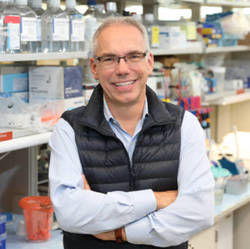Call Now Open
2026 Oxford-Harrington Rare Disease Scholar Award

Oncology
Developing New and Better Therapeutics to Treat Hematological Malignancies
2018 Harrington Scholar-Innovator
One of the biggest roadblocks in fighting cancer is the ability of tumors to adapt in such a way as to escape our current treatments.
“We don't fully understand what happens inside the cancer cells when they are hit by the treatments we use in our patients,” Dr. Wiestner says. “Specifically, we ask what stress is the treatment triggering in the cancer cells, and why are some cells able to resist?”
Dr. Wiestner and his team have developed experimental antibodies that, when combined with an existing FDA-approved therapeutic antibody, effectively attack cancer cells, including those cancer cells that have found ways to evade being killed by conventional monoclonal antibodies.
“My father had Hodgkins lymphoma in the 1970s...he was lucky in the sense that by then people had figured out chemotherapy and were able to cure it,” Dr. Wiestner says.
“I hope that the work we're doing will lead to many more patients and their families feeling they were fortunate to live in a time when there were solutions to their cancers.”
As his team strives to move from preclinical models to human trial, Dr. Wiestner acknowledges the support from the Harrington Discovery Institute's Therapeutics Development team. “The Harrington folks are showing me how to get out of my physician-scientist shoes and into entrepreneurial shoes.”
“My impact wish is that we may have discovered a general principle by which antibody therapy can be made more effective so that it will benefit many patients with lymphoma, leukemia, multiple myeloma, and perhaps even solid tumors, such as colon and breast cancer.”
Source: Article from 2018-19 Annual Publication.